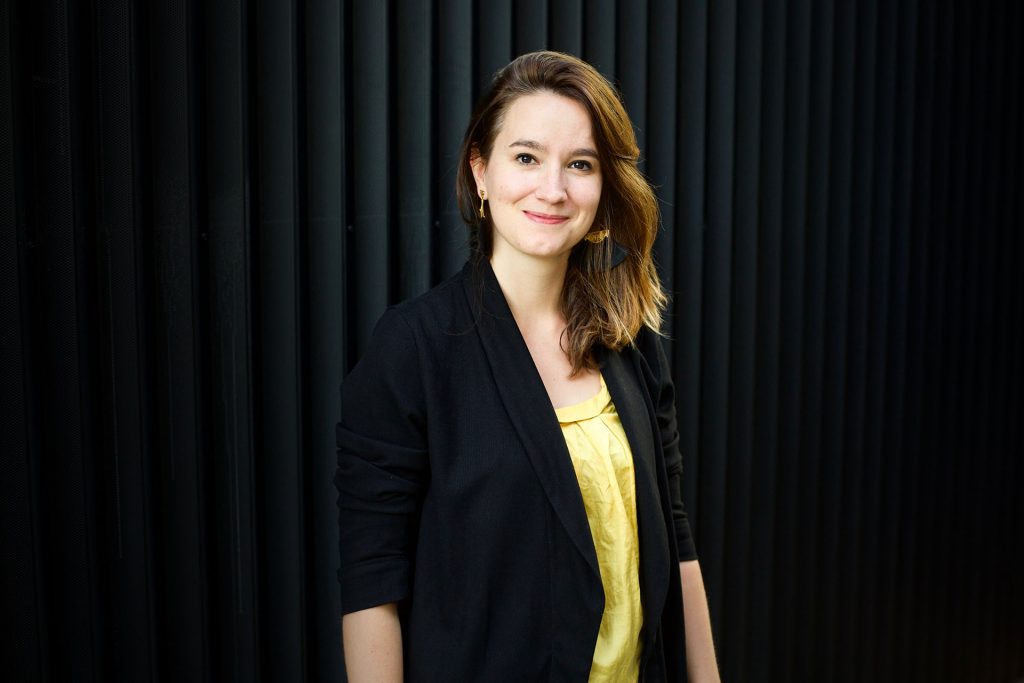Mélanie Marcel is an engineer, specialized in neuroscience. Having closely observed the world of research, she decided in 2012 to create SoScience, a company that promotes responsible research — the kind that makes a positive impact on daily life, in both social and environmental terms. Here, Mélanie discusses her career, her choices and her ambitions.
Before becoming an entrepreneur, you were a researcher in neuroscience.What impact did your studies have on your future career?
My studies were the starting point of a journey that led me to where I am today. When I started those studies, I wanted to specialize in the field of machine-brain interaction. I’m convinced that science should be for the common good and, for me, the ideal was to be able to help other people through my work – with the development of new, functional limbs for people with disabilities, for example.
But as I became more experienced, I realized that scientific value is driven by economics, and that a researcher’s desire to develop what they see as the right kind of products is simply not enough.
At the same time, it struck me how the history of science, philosophy and ethics is not taught – or hardly at all – to us researchers during our studies. And that was a real revelation to me. I thought it was absolutely essential to have a long, hard look at the whole system of valuing scientific research.
It’s fundamentally important to have this critical view, to question the way we do research, the way we teach it, and the way we exercise it as a profession. I don’t think I could have founded SoScience if I hadn’t been through that experience.
How does SoScience help companies?
SoScience helps companies to start lines of research into products with a positive social impact. Firms that use our services already have research resources – as major CAC40 corporations, larger SMEs that carry out their own R&D, etc.
We don’t measure companies’ carbon footprints or change their processes to limit their harmful externalities. We encourage them to think again about what’s at the very heart of their organization, and to ask themselves this question: “What could you offer the market to solve an environmental or social problem?” We are helping them to think about the future in a positive way.
How do you develop “responsible research”?
Aside from our consultancy services for companies, we also develop open innovation programs. Through these programs, we are able to bring together industrial firms, researchers, start-ups, SMEs, charities, foundations, etc. to develop products and innovations that respond directly to the needs of people who benefit from research.
Too often, these players each play their own role in the life-cycle of a technical innovation – between development, marketing and end-use – without actually working together.
At SoScience, we believe that by giving the beneficiaries of innovation a role at the design stage, the resulting solution will inevitably meet their needs more closely.
We hope that people will very soon associate advanced research with the various challenges that we face in our century
As a researcher and entrepreneur, have you had to make difficult choices when creating SoScience?
With Eloïse Szmatula, co-founder of SoScience, we started out as a collaborative project that we ran in parallel with our studies. At the end of our course, we had to make a real choice: to see SoScience as a genuine commercial project, and therefore to start our own company – or to continue on the path that we had been trained for – research.
We cared passionately about both, so it was a difficult choice to make. Especially since there is no room for error in the research world. I knew that if I chose SoScience, there would be no going back. But although the choice wasn’t easy, it’s not one I’ve ever regretted.
Today, we still haven’t found a laboratory that promotes the values we want to represent – or at least, not in any significant way. It means that the mission of SoScience is absolutely justified, and that encourages us to keep moving forward.
What are your long-term ambitions?
By making progress and by growing SoScience, we want research and responsibility to become inseparable from one another. We hope that people will very soon associate advanced research with the various challenges that we face in our century, such as the issue of climate change.
To achieve that, we are working in particular with public institutions, and hoping to make the voice of research heard.
Do you think the current crisis will have consequences for the world of research? Are you already aware of them today?
Yes, the crisis has inevitably had an impact on research, as it has on many other sectors. I only hope that it will be more positive than negative! In terms of science, I’m not naive, I know that the crisis has slightly tarnished the image of scientists among the general public – particularly through their representation by the media.
I think that we’re at a crossroads, and that two directions are there to be taken. I’d like the crisis to be a chance to rethink the amount of space given to science in public debate, so that people hear about research on a daily basis. I’d like scientific debate to really be a part of people’s daily lives, and to create a true scientific democracy.
What advice would you give a future social entrepreneur?
I’d say that the time is right to start your business! It will benefit from various kinds of support, networks and events where they can meet people.
At the same time, a lot of impact funds are being launched at the moment. Entrepreneurship today is the economy of tomorrow. So, if ever there was a time to reinvent society and to make plans for the future – this is it!
In 2013, Mélanie Marcel and SoScience participated in the ESCP entrepreneurship programme, the Paris Factory.
